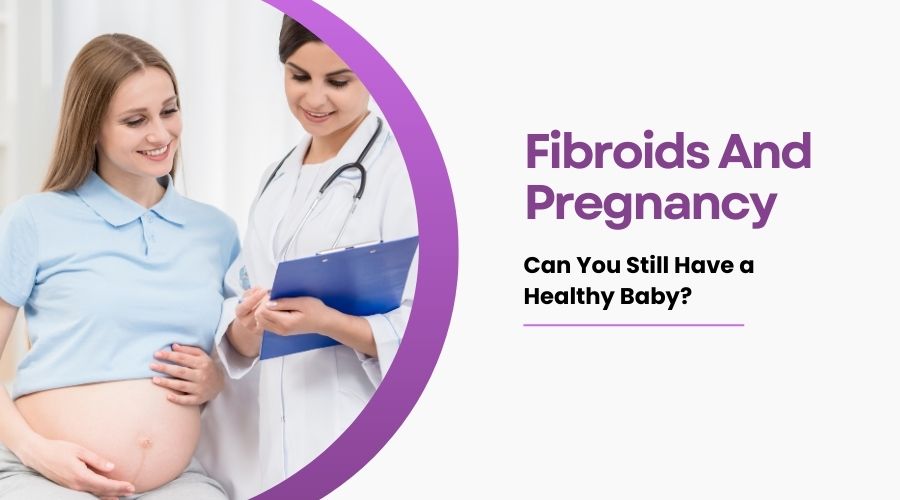
When a woman is diagnosed with uterine fibroids, it can raise many questions—especially if she’s planning to conceive. Uterine fibroids are benign (non-cancerous) growths that develop in the uterus, and while many women with fibroids have normal pregnancies and healthy babies, the relationship between fibroids and pregnancy can sometimes be complicated. At drpreetitandon, we understand how important it is for women to feel informed and empowered about their health. In this blog, we will explore how fibroids can impact pregnancy and what you need to know to optimize your chances of a healthy pregnancy.
What Are Fibroids?
Fibroids, also known as uterine myomas or leiomyomas, are common growths in the uterus. They vary in size, from as small as a pea to as large as a melon, and can grow inside the uterus (submucosal), on the outer wall (subserosal), or within the muscle layer (intramural). While fibroids don’t always cause symptoms, they can lead to heavy periods, pelvic pain, and discomfort during intercourse. The size, location, and other characteristics of fibroids can sometimes lead to problems during pregnancy or infertility.
Can You Get Pregnant with Fibroids?
Yes, many women with fibroids can still get pregnant. In fact, fibroids are often discovered when a woman undergoes an ultrasound while trying to conceive. While fibroids can sometimes interfere with fertility, many women with fibroids have no trouble getting pregnant. However, depending on their size and location, fibroids can have varying effects on pregnancy.
How Do Fibroids Affect Pregnancy?
1. Miscarriage Risk
One concern for women with fibroids is the increased risk of miscarriage. Fibroids, particularly those that are located inside the uterine cavity (submucosal fibroids), can impact the ability of the embryo to implant or grow properly. Additionally, fibroids might disrupt the placenta's blood supply, raising the possibility of miscarriage or premature birth. However, many women with fibroids have successful pregnancies despite this risk.
2. Preterm Labor and Placental Issues
Large fibroids or those that distort the shape of the uterus can potentially cause complications like preterm labor or placental abruption (where the placenta separates from the uterine wall before delivery). The location and size of the fibroids can affect how the uterus stretches during pregnancy, potentially leading to early contractions.
3. Obstructed Labor
In some cases, fibroids can obstruct the birth canal, making vaginal delivery difficult or impossible. Fibroids located near the cervix may block the passage, necessitating a cesarean section (C-section) delivery. At drpreetitandon, we work closely with women to monitor the fibroids during pregnancy to ensure the safest delivery method for both mother and baby.
4. Pain and Discomfort
Fibroids can sometimes cause pain or discomfort during pregnancy, particularly if the fibroid undergoes degeneration (shrinks or dies) or causes pressure on other organs. This is more likely to occur during the second trimester when the uterus begins to expand. While this pain is typically manageable, it’s essential to stay in touch with your healthcare provider to rule out any serious issues.
5. Increased Risk of Cesarean Section
Women with fibroids, particularly large ones or those causing uterine distortion, may be at a higher risk of needing a cesarean delivery. However, with careful monitoring and treatment, many women with fibroids still have the option for a vaginal birth. Your healthcare team, including your obstetrician at drpreetitandon, will discuss the best delivery plan based on your specific condition.
Managing Fibroids During Pregnancy
1. Regular Monitoring
Regular ultrasounds or pelvic exams are essential to monitor the size and position of fibroids during pregnancy. Your doctor at drpreetitandon will guide you on how frequently you should be checked to ensure your fibroids aren't causing complications.
2. Watch for Symptoms
Be aware of symptoms like severe abdominal pain, heavy bleeding, or signs of preterm labor. Get in touch with your healthcare physician right once if you encounter any of these. Better results may result from the early identification of possible problems.
3. Work Closely with Your Doctor
It’s important to have a healthcare team that understands your unique situation. At drpreetitandon, we specialize in providing personalized care for women with fibroids, ensuring they have the best possible outcomes throughout their pregnancy.
4. Healthy Lifestyle Choices
You can enhance your general health and possibly reduce difficulties by leading a healthy lifestyle during pregnancy. Eat a balanced diet, stay hydrated, and avoid excessive weight gain. Regular, gentle exercise can also improve circulation and help reduce the risks associated with fibroids.
Can Fibroids Be Treated During Pregnancy?
In most cases, fibroids are not treated during pregnancy unless they cause significant complications. Medications used to shrink fibroids, such as GnRH agonists, are not safe to use during pregnancy. Unless it is absolutely required, surgery to remove fibroids is usually postpartum. If you’re concerned about the size or location of your fibroids, your healthcare provider will discuss any available options for management.
While fibroids can present challenges during pregnancy, the vast majority of women with fibroids go on to have healthy pregnancies and babies. With proper care, regular monitoring, and a strong relationship with your healthcare provider at drpreetitandon, you can increase your chances of a smooth pregnancy and safe delivery. If you have fibroids and are planning to conceive, or if you’re already pregnant and dealing with fibroids, don’t hesitate to contact us for expert guidance and support.



